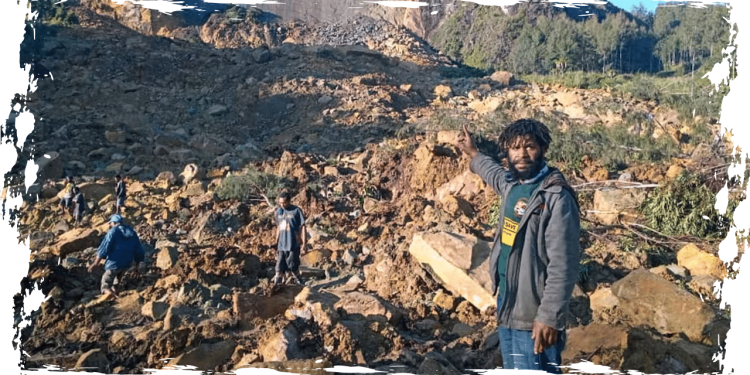Search and rescue workers are battling to get access to a mountaintop in Papua New Guinea, where more than 2,000 people are believed to have died in a catastrophic landslide.
In a letter to the United Nations resident coordinator on Sunday, Luseta Laso Mana, interim head of the South Pacific island nation’s National Disaster Centre, stated that the landslide “buried more than 2,000 people alive” and caused “major destruction” at Yambali village in Enga province.
The ongoing rain, streaming water, and unstable ground are making it incredibly difficult for rescuers to search for survivors in the muck.
The avalanche swept into Yambali village in the country’s north at 3 a.m. on Friday, while most residents were sleeping in their houses.
Residents have reported hearing screams from underground as debris over two stories high buried more than 150 houses.
Evit Kambu told Reuters, “I have 18 family members buried under the debris and soil I am standing on, and there are so many more family members in the village I cannot count.” “But I cannot retrieve the bodies, so I am standing here helplessly.”
Serhan Aktoprak, the head of the UN migration agency’s mission in Papua New Guinea, said prospects of finding survivors were dwindling more than three days after the landslide.
“At this point, people, I think, are realizing that the chances are very slim and that anyone can basically be taken out alive,” he stated.
Residents are still excavating debris with their bare hands, spades, and sticks to reach survivors because heavy equipment and other aid have been sluggish to arrive at the remote spot.
The community has poor cell phone reception and limited access to electricity, making communication with the rest of Papua New Guinea challenging.
The local tribal conflict has also hindered the mobility of humanitarian relief workers in the area, requiring soldiers to lead them to the landslide-affected zone and then return them to the province capital, approximately 60 kilometers away, at night.
According to a UN official, the first excavator arrived at the devastated location late Sunday, and six dead have already been found.
“It’s not like everyone is in the same house at the same time, so you have fathers who don’t know where their children are, mothers who don’t know where their husbands are, and it’s chaotic,” said Matthew Hewitt Tapus, a pastor in Port Moresby whose home town is 20 kilometers distant from the landslide.
The UN has warned that earth and debris could shift once more, and officials are urging residents in the surrounding area to evacuate.
So far, the landslides have displaced approximately 1,250 people.
The UN death toll in the tragedy remains at more than 670 individuals. The variation in the toll could be attributed to the remote location and the difficulty in obtaining an accurate population estimate. Papua New Guinea’s last valid census was in 2000, and many people live in remote highland settlements.
“We are not able to dispute what the government suggests, but we are not able to comment on it,” said Aktoprak.










